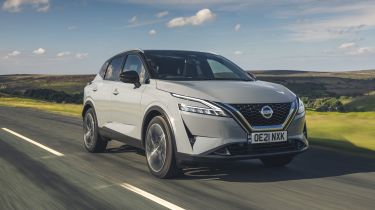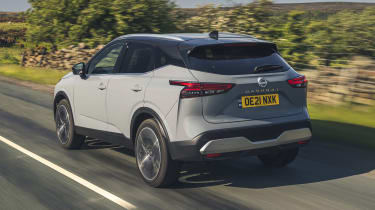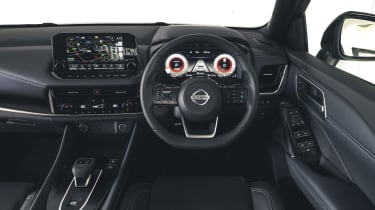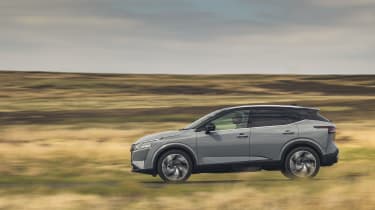Nissan Qashqai 1.3 DIG-T Tekna 2021 review
We get behind the wheel of the larger, more comfortable and higher-tech Nissan Qashqai SUV in the UK

Verdict
The Nissan Qashqai is an eminently usable and usefully practical family SUV. It might only be so-so to drive, and while there’s more tech much of it could still be better, but it nails the basics that some family SUVs don’t, making it an affordable and relatively successful evolution of the Qashqai formula for this third generation. However, we can’t help but feel it needs more in the way of electrification, so we’ll look forward to driving the e-Power model in the future.
It’s not every manufacturer that can claim it coined the crossover sector, let alone popularising the model niche like Nissan’s first and second generation Qashqais did.
The original car captured the imagination of millions, while the second built on that with even more style to back up the substance, winning countless awards in the process.
However, the pace of development moves quickly, and with the second iteration of the Qashqai having been on sale for seven years – and showing it in some areas – it’s now time for a new replacement.
Nissan has ticked the first box as this family SUV is a striking-looking machine, and style counts in this sector. Designed here in the UK, new interpretations of the Japanese brand’s V-Motion grille, cool LED running lights and strong surfacing with nice design touches mean it will certainly turn heads.
Used - available now

2022 Nissan
Qashqai
23,118 milesAutomaticPetrol1.3L
Cash £21,487
2018 Nissan
Qashqai
47,831 milesManualPetrol1.3L
Cash £13,187
2018 Nissan
Qashqai
19,700 milesAutomaticDiesel1.5L
Cash £16,087
2020 Nissan
Qashqai
19,398 milesManualPetrol1.3L
Cash £12,700The second box is checked too, because the Qashqai boasts an all-hybrid powertrain line-up. Key to that will be what Nissan calls its e-Power tech. This basically uses a 1.5-litre engine as a generator to charge a battery. This then feeds an electric motor, which is the only power source to physically drive the wheels, giving the feeling of an EV from behind the wheel and the potential for strong efficiency. Given the significance of this development for Nissan’s popular model, it’s a shame it won’t be on sale from launch.
Instead, it’s the 154bhp 1.3-litre mild-hybrid petrol we’re driving here in £31,565 front-wheel drive manual Tekna trim, so there’s no potential for all-electric running unfortunately. Still, with claimed efficiency of 44.1mpg and 145g/km of CO2, it’s 12-volt mild-hybrid system clearly helps. Nissan says it didn’t opt for a 48-volt system to help save weight, complexity and cost.
The incorporation of its hybrid tech across all of the planned powertrains has been made possible thanks to a new CMF-C platform, which Nissan claims has brought big benefits when it comes to packaging.
Take the rear doors, which now open up to 85 degrees. Compared with the previous-generation Qashqai, whose rear doors swept through a 70-degree arc, it means loading child seats and strapping in kids should be much easier.
Likewise, the car has grown by 35mm in length, 28mm in width and 20mm in the wheelbase. It means more legroom, according to Nissan, while a redesigned rear suspension layout has allowed the boot floor to be lowered, serving up a maximum of 504 litres of boot space – 74 litres more than before. A clever boot floor arrangement means plenty of storage and load height options to boost flexibility, too.
There’s more usable storage inside as well. In fact, the new Qashqai is simply a more usable car, and it shows clearly that Nissan understands what customers in this segment want.
However, every element of a family SUV is put under the microscope, including here the revised infotainment (an area where the previous Qashqai was really showing its age), comfort and refinement, so this new car has nowhere to hide.
Despite big 19-inch alloy wheels on Tekna models, with up to 20-inch alloys possible if you go for Tekna+ trim, the style does compromise the ride slightly. Top-spec cars on 20-inch wheels use a multi-link rear suspension set-up, which is a little jittery over smaller bumps due to the size of those rims, albeit with better body control at higher speed thanks to the more sophisticated layout.
All other models use a more conventional (and more affordable) torsion beam set-up. This tech doesn’t quite offer the same composure when you’re travelling faster, but it’s marginal and most owners won’t drive their cars in a way where they’ll find out, so it’d be our pick.
Slightly smaller wheels also help reduce the fidgetiness slightly, although it’s still not the smoothest or best-riding car in the class, albeit it’s far from uncomfortable.
Nissan has redesigned the power steering set-up as well to help improve feel and response, but while the Qashqai offers plenty of stability and secure handling that means this SUV acquits itself well enough, it’s not involving.
Thanks to up to a 60kg weight saving for the body due to extensive use of aluminium for the bonnet, doors and front wings, plus a composite tailgate, the Qashqai feels more agile than its predecessor, but SUV rivals easily match it.
It is refined though. The mild-hybrid assistance isn’t noticeable, but the 1.3-litre unit on a light throttle is smooth and quiet. It gets a little more vocal the more you push it, but it’s still not a noisy motor.
Performance is adequate, with a 9.5-second 0-62mph time, but it’s best to lean on the 260Nm of torque, keep the revs relatively low and cruise around gently to maximise refinement.
The manual makes more sense than the Xtronic automatic we tested previously, not least because it’s cheaper. It’s not the sweetest shift, but is still easy enough to use.
Talking of ease of use, we arrive at a key feature. Updated infotainment aims to address issues with the second-generation Qashqai, and while the nine-inch touchscreen is an improvement, with faster responses, the graphics could still be crisper. Wired Android Auto and wireless Apple CarPlay are included, and most owners might prefer to use one of these two systems.
The 12.3-inch digital dash offers a degree of configurability and is standard alongside the main nine-inch unit from N-Connecta trim and above, but like its counterpart, the resolution could be higher. Still, wireless phone charging is included, and is the quickest we’ve used in any car.
All this tech is integrated into a cabin that does feel a step up when it comes to quality. There’s soft-touch double-stitched material on the dash and a fresher, more premium look. It’s still a mainstream car though.
Tekna trim features all the kit you’d realistically need in a family SUV, including plenty of safety and driver assistance systems. These include autonomous emergency braking (including for when you’re reversing) with pedestrian, cyclist and junction assist, collision warning, lane departure warning and lane departure prevention, blind spot warning, cross traffic alert, adaptive cruise control with Drive Assist semi-autonomous tech to keep you in your lane, and seven airbags.
On top of this, Tekna models also feature a head-up display, Nissan’s Around View Monitor with moving object detection, all-round parking sensors, LED lights with high beam assist, dual-zone climate control, heated seats and a heated steering wheel.
Of course, more kit and a more premium look and feel means higher prices too. Most will opt for PCP finance and Nissan’s deals seem reasonable. Put down a £3,500 deposit on the lower-powered 138bhp 1.3 Tekna car and on a three-year deal limited to 10,000 miles per year monthly payments stand at £400 – not too bad for a versatile high-spec car with plenty of kit.
| Model: | Nissan Qashqai 1.3 DIG-T Tekna |
| Price: | £31,565 |
| Engine: | 1.3-litre 4cyl turbo petrol |
| Power/torque: | 154bhp/260Nm |
| Transmission: | Six-speed manual, front-wheel drive |
| 0-62mph: | 9.5 seconds |
| Top speed: | 128mph |
| Economy: | 44.1mpg |
| CO2: | 145g/km |
| On sale: | Now |












